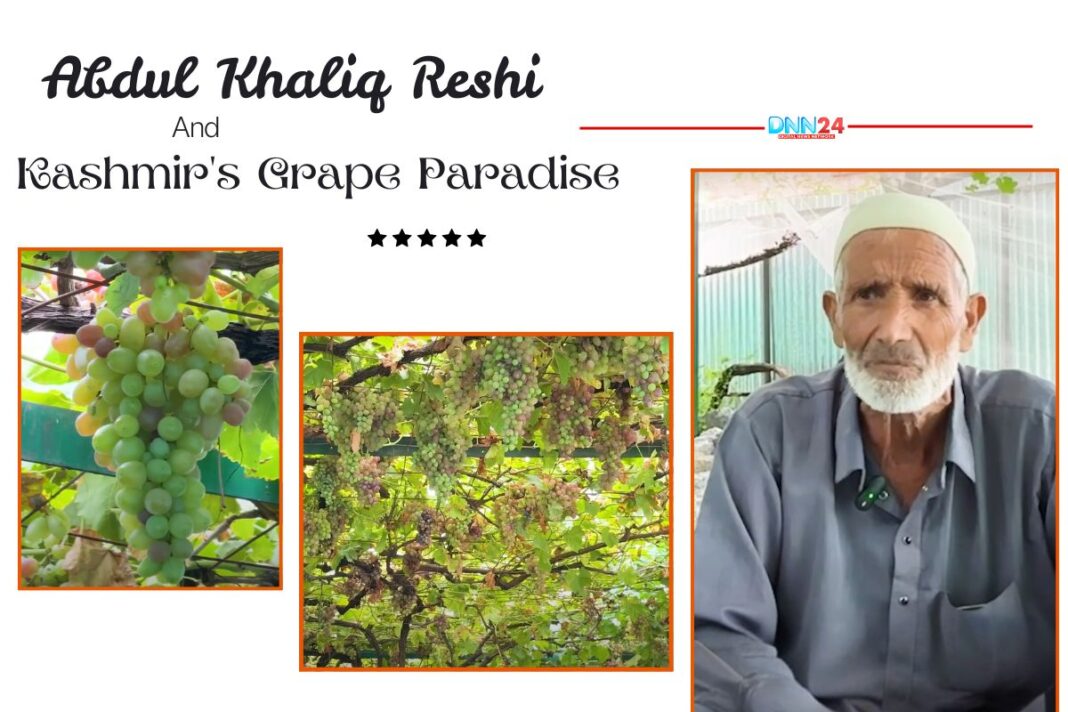Kashmir earns its reputation as a paradise on earth through stunning valleys, crisp air, and landscapes that seem to have been painted by nature itself. Abdul Khaliq Reshi has spent fifty years growing grapes in Repora village, where Kashmir’s sweetest fruit tells a story of tradition, patience, and labor passed through generations. Most people know this region for apples, walnuts, and saffron, but tucked away in Ganderbal district lies Repora village, a place that has quietly built its fame on something different: grapes. Locals call it the Village of Grapes, and once you see the vineyards stretching across sixty hectares, you understand why. The climate here works magic on the vines. Something about the soil, the altitude, and the careful balance of sun and shade produces grapes that defy ordinary expectations.
Where typical grape berries weigh four or five grams, the fruit from Repora reaches fourteen or fifteen grams. These are not just grapes but small globes of sweetness, each one carrying the distinct character of this mountain village. Walking through the vineyards during harvest season feels like stepping into a living painting, with clusters hanging heavy on the vines, their purple and green skins catching the afternoon light. The farmers here do not simply grow fruit; they also cultivate a variety of vegetables. They tend a tradition that has survived generations, adapting to change while holding fast to methods passed down from their ancestors.
Abdul Khaliq Reshi: Fifty Years Among the Vines
You cannot tell the story of Repora without mentioning Abdul Khaliq Reshi. At eighty years old, he has spent five decades working with grapevines, learning their rhythms and moods the way a musician learns an instrument. He inherited this knowledge from his father, who learned it from his father before him. Speaking to DNN24, Abdul Khaliq explains that grape farming represents more than work or income. It carries the memory of his forefathers, whose hands shaped the same soil, and whose eyes watched the same mountains. In earlier times, farmers built wooden frames to support the vines, but Kashmir winters proved merciless.
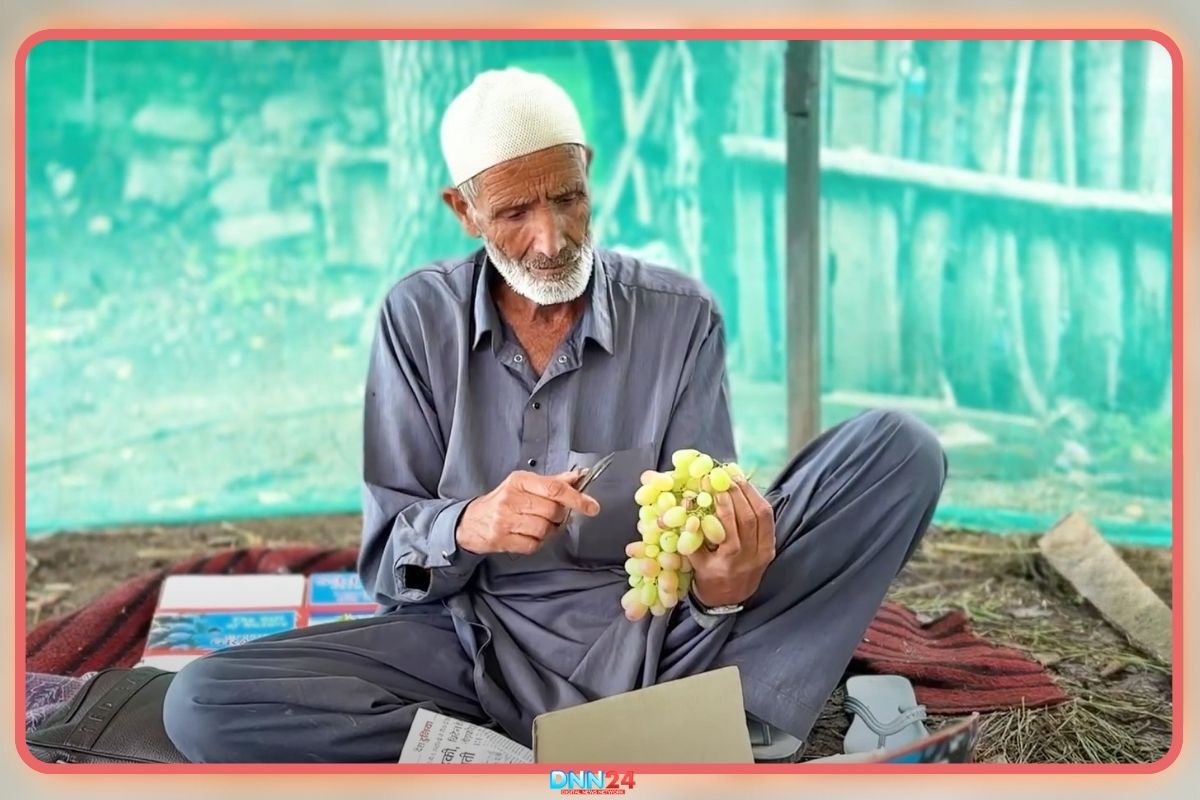
December snowfall crushed these structures year after year, forcing farmers to rebuild every March when spring arrived. The cycle consumed time, money, and energy. Then the horticulture department stepped in with iron frames that could withstand heavy snow. This simple change transformed everything. The iron structures lasted through seasons, eliminating the annual burden of reconstruction. The department also provided nets to protect ripening fruit and supplied medicines to ward off disease. These interventions did not replace traditional farming wisdom but supported it, allowing farmers like Abdul Khaliq to focus on nurturing their crops rather than constantly fighting the elements.
Abdul Khaliq Reshi:Where Generations Meet in the Fields
Abdul Khaliq no longer works alone. His grandson has joined him in the vineyards, creating a bridge between past and future. They move through the rows together, the grandfather with scissors in hand, carefully removing damaged berries so the healthy ones can thrive. The grandson watches, learns, and asks questions. This passing of knowledge occurs not through formal instruction, but through shared labour and quiet observation. The older man’s hands know precisely which berries to cut, which clusters need more sun, and when the vines require water. His grandson absorbs this understanding gradually, the way apprentices have always learned trades.
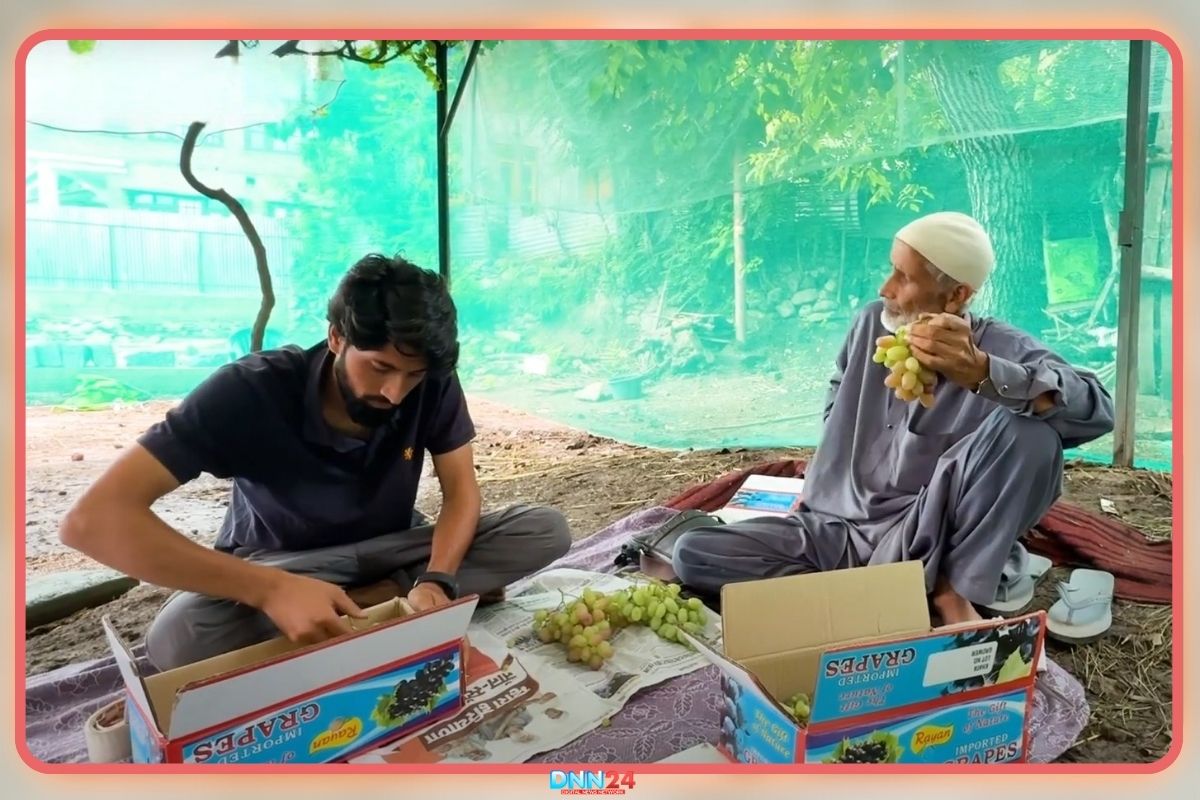
Abdul Khaliq grows two main varieties: Sahibi and Hussaini. Both varieties enjoy strong reputations for sweetness and size. Other farmers might cultivate more types, seeking diversity, but he believes in perfecting what he knows best. The grapes get packed right there in the field, then loaded onto autos that carry them to the Srinagar fruit market each evening. From there, they travel across India, ending up in cities far from these mountain valleys. Someone biting into these grapes in Mumbai or Delhi tastes not just fruit, but the particular terroir of Repora: the cool nights and warm days, the mineral-rich soil, and the careful pruning that produced each berry.
Abdul Khaliq Reshi: Fighting Weather and Waiting for Solutions
Growing grapes in Kashmir brings constant challenges. The weather remains unpredictable. Sudden rain can split ripening fruit. Unexpected frost can damage tender shoots. But the biggest problem, according to Abdul Khaliq, arrives during harvest. All the grapes ripen simultaneously, creating a narrow window for picking and selling. If farmers cannot quickly move their entire crop, the fruit begins to spoil. No amount of care in growing can prevent losses when storage fails. Abdul Khaliq believes cold storage facilities would solve this problem. With proper refrigeration, farmers could harvest their grapes and hold them for better market conditions, rather than selling everything immediately, regardless of the price.
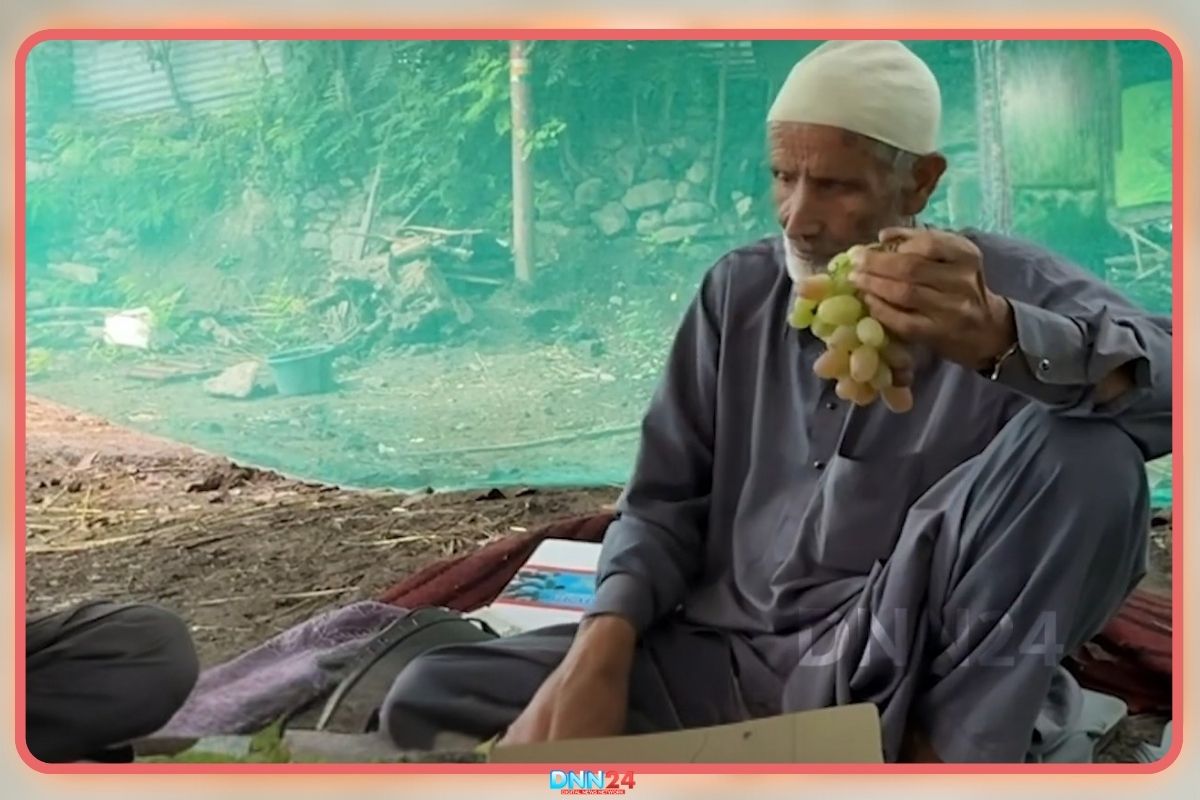
This would significantly reduce waste and improve farmers’ incomes. His voice carries both worry and hope when discussing this issue. He understands that government support has already considerably improved farming conditions, but this one missing piece continues to cause harm to farmers. Despite these difficulties, pride comes through when he talks about his work. The grapes represent more than commerce. They embody a lifetime of learning, days spent under the sun, seasons of watching and waiting. When people across India enjoy these grapes, they taste the dedication poured into every vine.
Repora: A Village That Feeds a Region
Repora produces between seven hundred fifty and nine hundred metric tons of grapes annually. To put this into perspective, all of Kashmir grows grapes on approximately five to six hundred hectares and produces a total of eleven to fifteen hundred metric tons. One small village thus accounts for a substantial portion of the entire region’s grape harvest. This concentration happens because Repora’s farmers have refined their methods over generations, learning precisely what works in their particular microclimate. The village landscape during the growing season appears almost unreal, with green vines spreading in every direction, thick with leaves and heavy with fruit clusters.
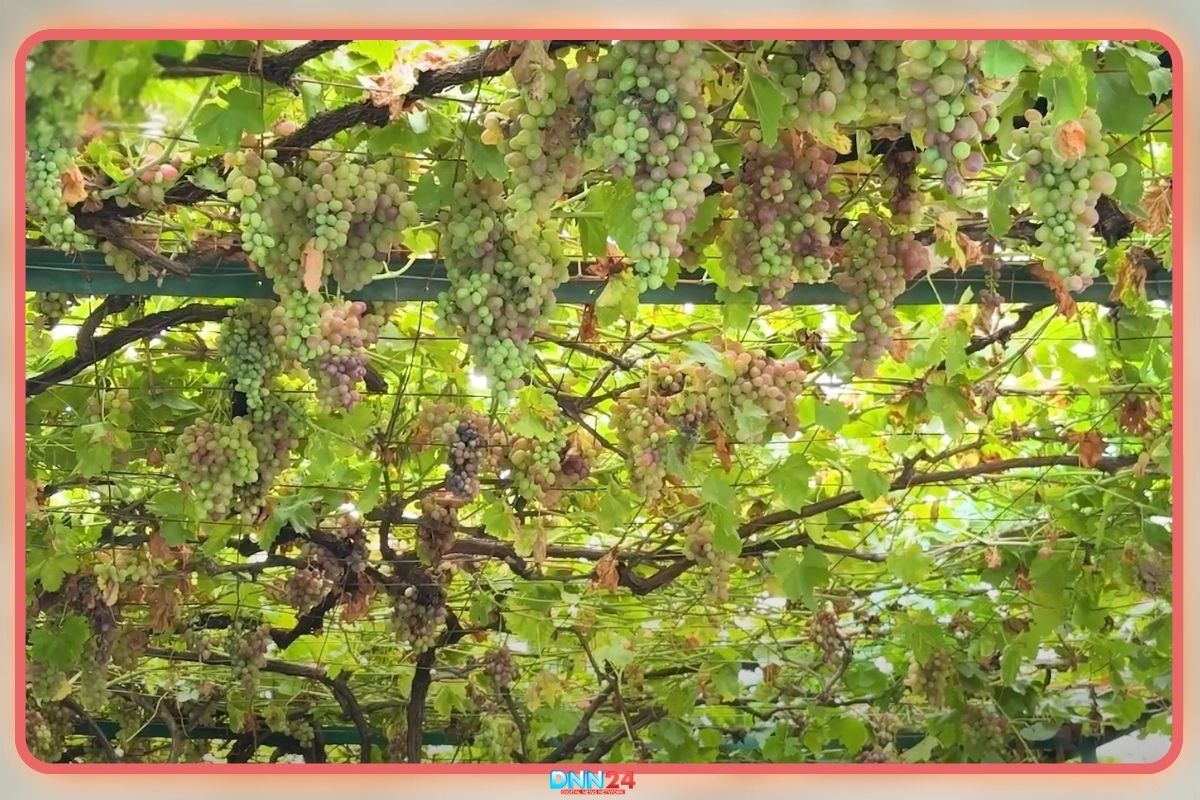
Farmers move among them constantly, checking, pruning, protecting. The work never truly stops from early spring through late autumn. Each grape that reaches market represents dozens of small decisions and actions. Which shoots to keep during pruning, how much water to apply, when to use protective treatments, and which clusters to thin for better fruit development. This accumulated knowledge makes the Repora grapes special. The fruit carries not just natural sweetness but the intelligence of farmers who have spent lifetimes understanding these plants. Visitors who see the vineyards for the first time often remark on their beauty, but beauty emerges as a byproduct of function. Everything exists to serve the vines and maximise their potential.
Also Read: Dr Ramakanta Panda’s Remarkable Journey from Operation Theatre to Forest Trails
You can connect with DNN24 on Facebook, Twitter, and Instagram and subscribe to our YouTube channel.

